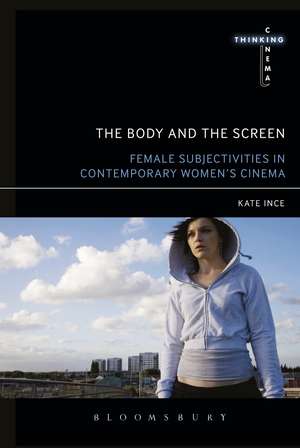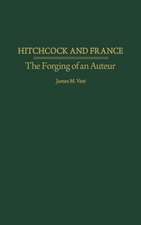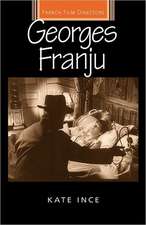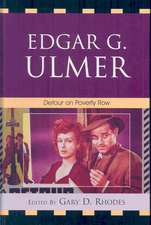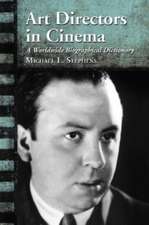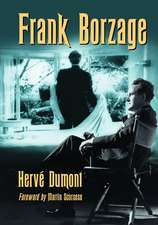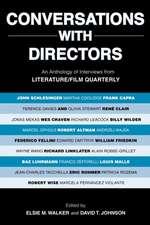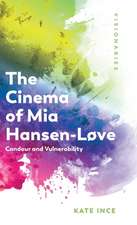The Body and the Screen: Female Subjectivities in Contemporary Women’s Cinema: Thinking Cinema
Autor Kate Inceen Limba Engleză Paperback – 11 ian 2017
| Toate formatele și edițiile | Preț | Express |
|---|---|---|
| Paperback (1) | 237.28 lei 6-8 săpt. | |
| Bloomsbury Publishing – 11 ian 2017 | 237.28 lei 6-8 săpt. | |
| Hardback (1) | 830.62 lei 6-8 săpt. | |
| Bloomsbury Publishing – 11 ian 2017 | 830.62 lei 6-8 săpt. |
Preț: 237.28 lei
Preț vechi: 272.54 lei
-13% Nou
Puncte Express: 356
Preț estimativ în valută:
45.41€ • 46.50$ • 37.77£
45.41€ • 46.50$ • 37.77£
Carte tipărită la comandă
Livrare economică 19 martie-02 aprilie
Preluare comenzi: 021 569.72.76
Specificații
ISBN-13: 9781623565817
ISBN-10: 1623565812
Pagini: 208
Ilustrații: 12 bw illustrations
Dimensiuni: 152 x 229 x 19 mm
Greutate: 0.34 kg
Editura: Bloomsbury Publishing
Colecția Bloomsbury Academic
Seria Thinking Cinema
Locul publicării:New York, United States
ISBN-10: 1623565812
Pagini: 208
Ilustrații: 12 bw illustrations
Dimensiuni: 152 x 229 x 19 mm
Greutate: 0.34 kg
Editura: Bloomsbury Publishing
Colecția Bloomsbury Academic
Seria Thinking Cinema
Locul publicării:New York, United States
Caracteristici
Readings of films informed by more recent developments in feminist theory, philosophy and film criticism
Notă biografică
Kate Ince is Reader in French Film and Gender Studies at the University of Birmingham, UK.
Cuprins
AcknowledgementsList of Illustrations Chapter 1 Female Subjectivity in Philosophy and Theory Chapter 2 Feminist Film Studies and Women's Cinema After PsychoanalysisChapter 3 BodyChapter 4 LookChapter 5 SpeechChapter 6 PerformanceChapter 7 DesireChapter 8 Freedom ConclusionBibliography Filmography
Recenzii
The Body and the Screen makes a fine contribution to the field of film philosophy in its examination of how feminist phenomenology can be brought into dialogue with female subjectivity in film.
This trenchant volume makes a fine and timely contribution to the field of film philosophy in its examination of how the work of leading feminist philosophers may be brought into dialogue with film. Through Simone de Beauvoir and others, Ince makes a case for rigorous thought about embodied female subjectivity as explored through cinema. This she addresses in close readings of works by the major British and French female directors of the last two decades. Whether in her discussion of the phenomenological geography of Agnès Varda's 'film-world' or of performed co-authorship in Sally Potter, Ince is an acute and erudite interlocutor. The Body and the Screen will quickly become a work of reference in its field.
Through insightful and attentive exploration of selected works by French and British women filmmakers of the last 25 years, Kate Ince demonstrates how feminist phenomenology, beginning with Simone de Beauvoir and continuing into the present decade, offers new and exciting ways of understanding women in, and, and of the cinema. Clearly and concisely written, Ince's book is a tour de force exploration of the ways in which philosophy and women's cinema can inform and enrich each other.
This trenchant volume makes a fine and timely contribution to the field of film philosophy in its examination of how the work of leading feminist philosophers may be brought into dialogue with film. Through Simone de Beauvoir and others, Ince makes a case for rigorous thought about embodied female subjectivity as explored through cinema. This she addresses in close readings of works by the major British and French female directors of the last two decades. Whether in her discussion of the phenomenological geography of Agnès Varda's 'film-world' or of performed co-authorship in Sally Potter, Ince is an acute and erudite interlocutor. The Body and the Screen will quickly become a work of reference in its field.
Through insightful and attentive exploration of selected works by French and British women filmmakers of the last 25 years, Kate Ince demonstrates how feminist phenomenology, beginning with Simone de Beauvoir and continuing into the present decade, offers new and exciting ways of understanding women in, and, and of the cinema. Clearly and concisely written, Ince's book is a tour de force exploration of the ways in which philosophy and women's cinema can inform and enrich each other.
